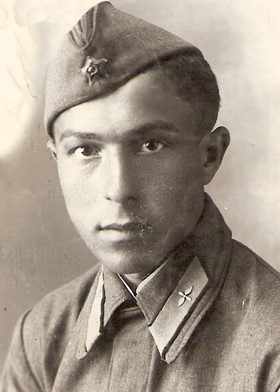
Iosif Birenberg, a wartime photograph.
Iosif Birenberg was born in 1921 in the village of Khriplia, northeast of Korosten, northern Ukraine (the village was abandoned after the Chernobyl catastrophe of 1986). His was the only Jewish family in this Ukrainian village; the family was religious. His father Shmuel had been a shop owner before World War I, but was ruined financially and, after the Russian Revolution, received a plot in the village and made his living by agricultural labor. He died in 1937. In the following year, Iosif finished school in the nearby village of Bazar and entered a teachers' college in Korosten. Before his mobilization into the Red Army in January 1940, he worked at a village school, both as a teacher of German and as school principal.
In 1940, Iosif Birenberg was drafted and sent to a school for junior aircraft technicians in Baku, Azerbaijan. Upon finishing the course, he was assigned to the 84th Regiment of Fighter Aircraft in Yerevan, Armenia. Many members of this regiment believed that war against Turkey to conquer the Kars Region (ceded by Russia to Turkey after World War I) was approaching, especially since the Soviet Union had already annexed a large part of Poland in 1939 and part of Finland in the Winter War of 1939-40.
The beginning of Operation Barbarossa in June 1941 found Iosif in the regiment's hospital, sick with malaria. Hospitalization failed to cure him completely and he had recurrences of this disease. In July 1941, the 84th Regiment was transferred to Iran. The regiment took part in the joint British-Soviet occupation of Iran, where the regiment safeguarded the delivery of military equipment and ammunition in the framework of the Lend-Lease Agreement. Only in November 1941 did the regiment return to Soviet territory (to the North Caucasus). There Iosif learned that most of his family – his mother and four sisters with their children -- had succeeded in fleeing from the Germans. Three of his brothers and three of his brothers-in law were at the front (three of the six did not survive). His sister Malka, her husband, and their two daughters remained under occupation. Close to the end of the war, Iosif learned that all of them were murdered by local politsais (collaborators).
From January to May 1942, Sergeant Birenberg took part in the abortive Kerch-Feodosia landing operation (in the eastern Crimea), after which his regiment abandoned all its aircraft to the enemy. Iosif emerged from this catastrophic operation unharmed. He spent the second half of 1942 and the first half of 1943 in a reserve aircraft regiment in the North Caucasus.
In the summer of 1943, since he knew German, Birenberg was sent to the Military Institute of Foreign Languages in Moscow. Eight months later, he was assigned to the 35th Rifle Regiment, which was operating in the North, near the Norwegian border; his duty was to interrogate German POWs. In October and November 1944 the regiment took part in the Red Army's Petsamo–Kirkenes offensive. Birenberg was wounded during the last stage of this operation.
In 1945, Birenberg was transferred to Pomerania. In March, he participated in the liberation of the concentration camp near Neustadt (now Wejherowo, Poland). In April 1945, during the takeover of Gdynia, he was seriously wounded.
After the war, Birenberg settled in Moscow. He married a daughter of the gabai of the Korosten synagogue. The traditional marriage ceremony, or chuppah, took place in Korosten, and the official Soviet wedding – in Moscow. In 1991, the Birenbergs immigrated to Israel.
An episode from the liberation of the concentration camp near Neustadt, March 1945.
"[When we entered], we saw dead people lying there, together with those still alive and with those dying on the barrack floor. Living but unmoving people who resembled skeletons, looked at us sympathetically and with longing... Of the captives we took, we brought two SS men to the camp – to see what they had done. We did not intend to kill them, but the prisoners immediately attacked them and beat them to death on the spot with bricks. Because they considered them their murderers, no power in the world could prevent them from killing them. When we left the camp, beyond the fence an even more horrible sight appeared before us. Every twenty meters, along the whole way that we were pursuing the Nazis, there lay the still warm bodies of young Jewish men who had been shot in the neck. I followed this mournful path, past the bodies of my brothers who had been shot to death. My fellow soldiers who were proceeding beside me stared at me intently, wanting to find out how I was reacting. I did not note either compassion or regret in their eyes.
So, after this camp, my attitude towards the Germans changed for the worse: and my heart was wrenched by my personal grief. I remember, I will never forget, that they had shot to death my sister and her husband and their two daughters."
[Iosif Birenberg, Polozhis' na sebia, Jerusalem: Dostoianie, 2010, p. 144.






